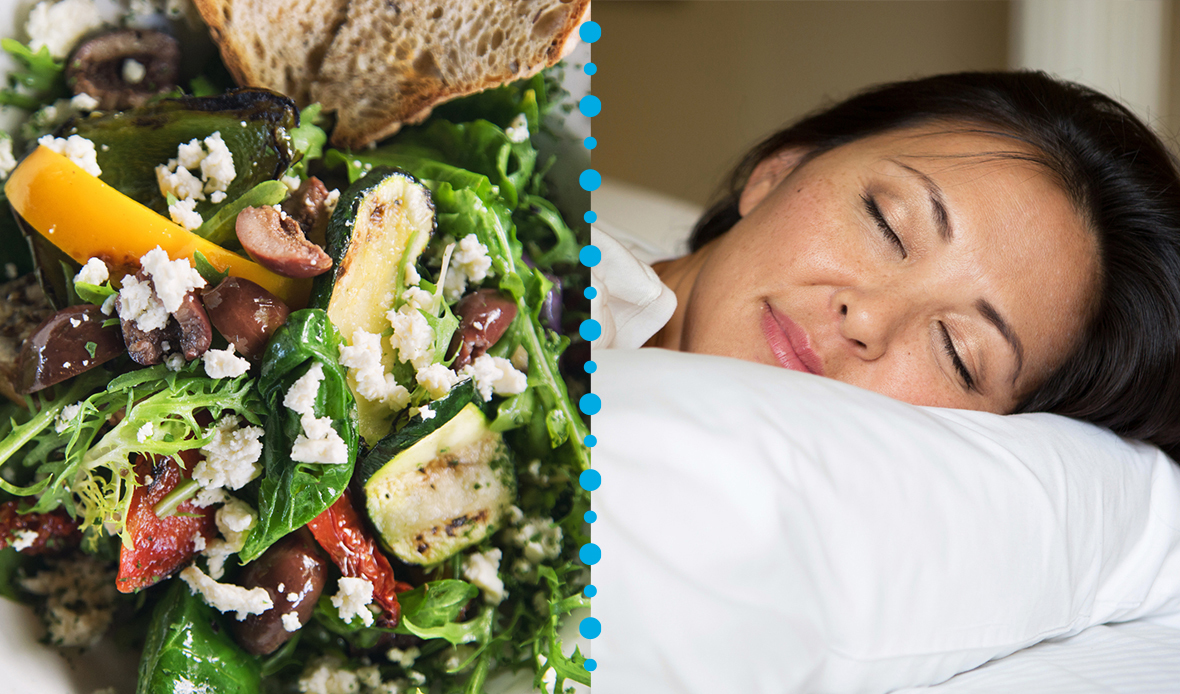
A lot of Americans are in search of better rest. Packed lives, plenty of stress, and not-so-great habits mean that as many as one in three Americans aren't getting the seven to eight hours of sleep a night they need.1
So, if you're feeling foggy or fatigued, you're not alone.
The good news is that there are plenty of ways to improve both the length and quality of your sleep. And one often-overlooked strategy is as close as your fridge. Diet and sleep are profoundly linked, just like so many other aspects of human health. The science can help us make choices to live well.
Here are four ideas that just may make a difference for you:
Go Mediterranean.
Research has shown a correlation between the Mediterranean diet and healthy sleep. Studies of adults in France, Spain, Italy and Greece—countries that surround the Mediterranean—show that those who follow this eating pattern have a lower risk of insomnia, better sleep quality, and longer sleep duration compared with other adults.2
You can eat like a Mediterranean by focusing on these three big concepts:
Fiber and fat may be the key to why the Mediterranean diet works. Eating more fiber is linked to more time spent in restorative slow-wave sleep. Consuming more saturated fat—the kind found in red meat, butter, margarine—is associated with less time in slow-wave sleep.
Get enough protein, but not too much.
Roasted chicken, turkey, eggs, and fish. Chickpeas, black beans, Greek yogurt, and tofu. Nuts and seeds. These are all high-quality protein sources, and they're the backbone of a sleep-friendly diet.
Scientists are studying the role of the amino acid tryptophan in this protein-sleep connection. If the word tryptophan sounds familiar, you may associate it with your Thanksgiving turkey. Wondering about that nap you crave about an hour after the eating is done? It may be the tryptophan in the turkey. Turns out tryptophan is a precursor to the sleep-regulating hormone melatonin.3
Cut back on sugar.
The news on sugar and sleep is not entirely clear. In a major national health survey, short sleepers, those who tend to sleep fewer than six hours a night, had a higher sugar intake than normal sleepers. But somewhat surprisingly, very short sleepers who sleep fewer than five hours a night, consume less sugar.4
Researchers aren't sure how to explain the relationship between sugar intake and sleep duration, they do agree on this: Sugar intake has a negative association with sleep quality and is linked to a higher chance of waking up during the night.
Pay attention to when as much as the what.
In general, a regular eating schedule throughout your day is the best plan to follow for optimal sleep. Be especially cautious of meals late in the day. Big meals consumed close to bedtime can interfere with the body's ability to fall asleep.5
It may be even more important to watch what you drink.
The best news about eating for better sleep is that you'll invite a host of additional benefits for your overall health. From weight loss to lower cardiovascular risk, cancer prevention to a healthy brain—it all adds up when you make better food choices.
If you’d like to learn more ways to improve your sleep—and your overall well-being—a MOBE Guide can help. Get started today.
References:
1. Centers for Disease Control and Prevention. Short Sleep Duration Among US Adults. https://www.cdc.gov/sleep/data_statistics.html
2. American Heart Association. What is the Mediterranean Diet? https://www.heart.org/en/healthy-living/healthy-eating/eat-smart/nutrition-basics/mediterranean-diet
3. Santa Cruz, J. The Link Between ZZZs & Eats. Today's Dietitian. Vol. 21, no. 8, p. 32. https://www.todaysdietitian.com/newarchives/0819p32.shtml
4. Healthline. What is tryptophan? https://www.healthline.com/health/tryptophan
5. Mayo Clinic. Foods and sleep. https://www.mayoclinic.org/diseases-conditions/insomnia/expert-answers/foods-that-help-you-sleep/faq-20057763